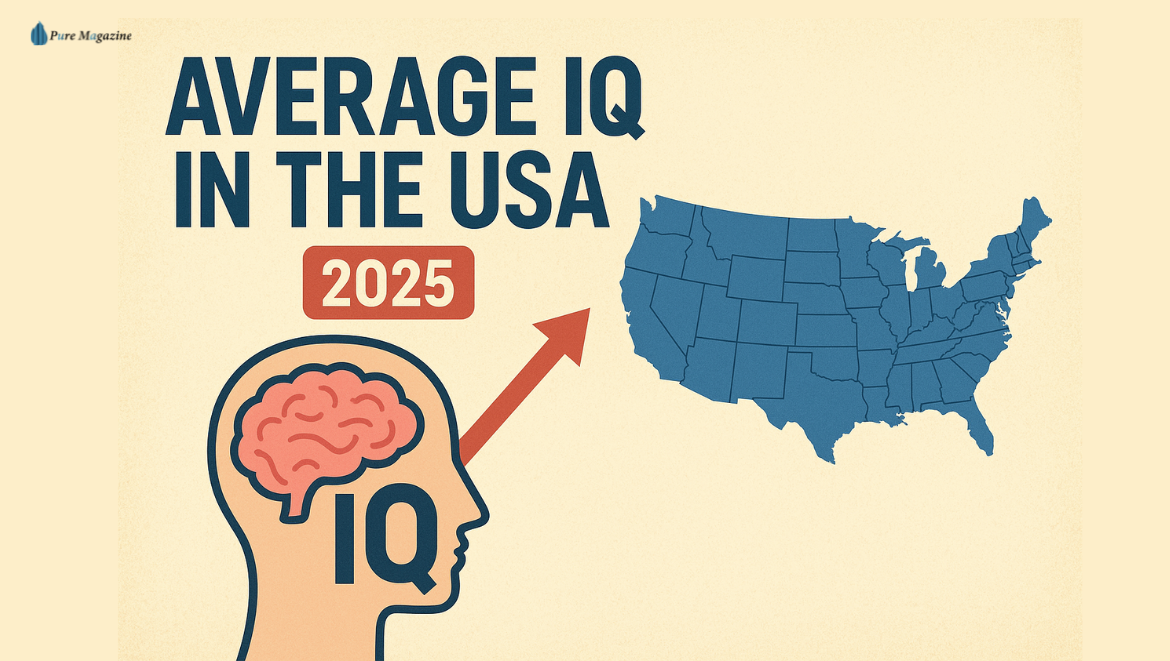Here’s something funny about numbers — they make us feel certain, even when the truth is complicated.
You’ve probably heard it: “The average IQ in USA is 98.” Sounds clear, right? But if you scratch the surface, that figure says a lot less about how smart Americans are and a lot more about how we define “intelligence.”
Let’s be honest — IQ has always been a loaded topic. Some treat it like gospel, others dismiss it completely. The reality, as usual, sits somewhere in between.
What IQ Really Measures (and What It Doesn’t)
IQ — short for Intelligence Quotient — was designed to measure things like problem-solving, reasoning, and comprehension.
Basically, how efficiently your brain handles abstract challenges.
But that’s not the same as wisdom, creativity, or adaptability. A high IQ won’t help you read a room, build trust, or invent something new from chaos. And in today’s world, those are the traits that often matter more.
So yes, the average IQ in USA sits around 97 to 98, depending on which study you read. But that’s not a measure of American intelligence — it’s a reflection of a system: education, nutrition, mental health, and even how often people read versus scroll.
The Average: 97–98, But Context Matters
According to WorldPopulationReview and NCHStats, Americans cluster just below the global average of 100.
But let’s be clear — “below” doesn’t mean “worse.” IQ tests are standardized so the middle score always floats near 100. The small dip can result from hundreds of subtle cultural and environmental differences, not some mass intellectual decline.
If anything, the U.S. IQ data shows stability. Over the last decade, numbers barely moved — even as technology rewired how we learn and think.
And that’s part of the point: intelligence isn’t static. It’s adaptive. Americans have traded memorization for multitasking, deep focus for rapid synthesis. The test just hasn’t caught up to how our minds now work.
The IQ Map: Why Some States Score Higher
When IQ is broken down by state, familiar patterns pop up.
Massachusetts, New Hampshire, and Minnesota tend to sit near the top. Mississippi, Louisiana, and West Virginia often appear lower on the charts.
But those gaps aren’t about innate ability — they’re about opportunity.
A kid who grows up in a home with books, good nutrition, and stable schooling will test higher, not because they’re “smarter,” but because their environment lets their brain grow to its full potential.
IQ tests don’t measure potential. They measure preparation.
So, the next time someone compares state IQs like baseball stats, remember: they’re really comparing funding, infrastructure, and stress levels — not brain cells.
Why IQ Tests Aren’t as Neutral as You Think
The most common IQ exams — WAIS and Stanford-Binet — were built for consistency. But “standardized” doesn’t mean “neutral.”
Language bias, test anxiety, and cultural familiarity — all can skew results by 5 to 10 points. Even a lack of sleep or hunger can make a difference.
Modern psychologists often treat IQ as one data point among many. The American Psychological Association puts it plainly: “IQ scores can predict performance in certain domains, but they do not capture the full range of human intelligence.”
Translation? It’s useful — just not gospel.
What Shapes IQ in the U.S.
Here’s what science (and common sense) agree on: intelligence grows from both nature and nurture.
- Genetics: Sure, it matters. But genes don’t determine destiny.
- Education: Access and quality still shape most cognitive outcomes.
- Nutrition: Early childhood diets affect attention and memory for life.
- Mental Health: Chronic stress can stunt cognitive growth.
- Technology: Great for exposure, terrible for attention span.
Harvard’s Steven Pinker once wrote that “intelligence is the ability to adapt.” That’s a reminder that the brain isn’t static — it responds to what we feed it, literally and figuratively.
How the U.S. Stacks Up Globally
Globally, the average IQ in USA sits in the upper-middle bracket — well ahead of many countries, slightly behind East Asia, and parts of Europe.
| Country | Average IQ |
| Japan | 106 |
| South Korea | 105 |
| Switzerland | 102 |
| USA | 97–98 |
| UK | 100 |
| Mexico | 87 |
It’s tempting to treat this as a scoreboard, but that misses the nuance.
Japan’s advantage, for instance, aligns with heavy early math education and social emphasis on precision. The U.S. leans toward creativity and independence — traits harder to measure but arguably as vital in a fast-changing world.
So, depending on the test, Americans may not “win,” but they’re still building the tools that shape modern life — from AI to art to innovation.
Experts on the Modern IQ Debate
Dr. Linda Gottfredson, a cognitive psychologist known for her intelligence research, once said:
“IQ predicts academic success, but not necessarily life success.”
That distinction matters now more than ever.
Silicon Valley doesn’t hire based on IQ. They look for curiosity, problem-solving, and teamwork — qualities that don’t fit neatly on a scale.
In many ways, the U.S. has shifted from an IQ economy to a creativity economy. The smartest people in the room aren’t the ones scoring 130 — they’re the ones asking better questions.
What’s Next: The Future of IQ in America
So, what happens next?
Experts suspect the national average may stay stable — but how we use intelligence will keep evolving.
- AI tools are boosting how kids learn, but may also weaken memory skills.
- Digital overload could erode attention spans.
- Mental health programs are helping reverse cognitive stress effects.
- STEM education initiatives may lift scores in underfunded areas.
In short, the number might stay 97–98 — but what that means will keep changing. Intelligence is moving from static measurement to adaptive performance. It’s not about what you know, but how fast you can relearn.
FAQs
Q1. What is the current average IQ in the USA?
As of 2025, the average IQ score in the United States is estimated at 97–98, according to data compiled by WorldPopulationReview and NCHStats. This score places the U.S. slightly above the global midpoint of 95, indicating overall strong access to education and cognitive development resources across most states.
Q2. Which U.S. states have the highest average IQs?
Recent rankings show that Massachusetts, New Hampshire, and Minnesota lead the nation in average IQ scores. These states consistently rank high due to strong public education systems, higher median incomes, and lower student-to-teacher ratios, all of which contribute to better cognitive outcomes over time.
Q3. How does the U.S. compare to other countries in terms of IQ?
Globally, the U.S. average IQ sits above most countries, but slightly behind nations like Japan, Switzerland, and South Korea. This suggests that while American test performance is solid, there’s still room for improvement in areas like STEM education, nutrition, and mental health support, which are closely linked to cognitive performance.
Q4. Can you actually improve your IQ?
Yes — while genetics play a role, research shows that IQ isn’t fixed. It can be boosted through lifelong learning, consistent reading, problem-solving exercises, quality sleep, nutrition, and reduced stress levels. Access to stimulating environments and education also significantly improves fluid intelligence — the ability to reason and think abstractly.
Q5. Does having a higher IQ guarantee success in life?
Not necessarily. A high IQ can open doors, but success depends far more on emotional intelligence (EQ), creativity, discipline, and adaptability. Many psychologists argue that resilience and social skills often determine long-term achievement more than IQ alone.
Final Thoughts: Numbers Don’t Define Intelligence
The truth? IQ is just a number — a reflection of patterns, not potential.
America’s average IQ doesn’t define its people. What defines them is how they think — critically, creatively, independently.
The real intelligence isn’t in a scorecard. It’s in the everyday problem-solving that fuels the country: nurses navigating chaos, engineers solving impossible puzzles, teachers sparking curiosity in kids who don’t yet know what they’re capable of.
So yes, the average IQ in USA might be 97 or 98.
But intelligence? That’s something this country has never lacked — it just takes different shapes than a test can measure.
Visit: Pure Magazine








